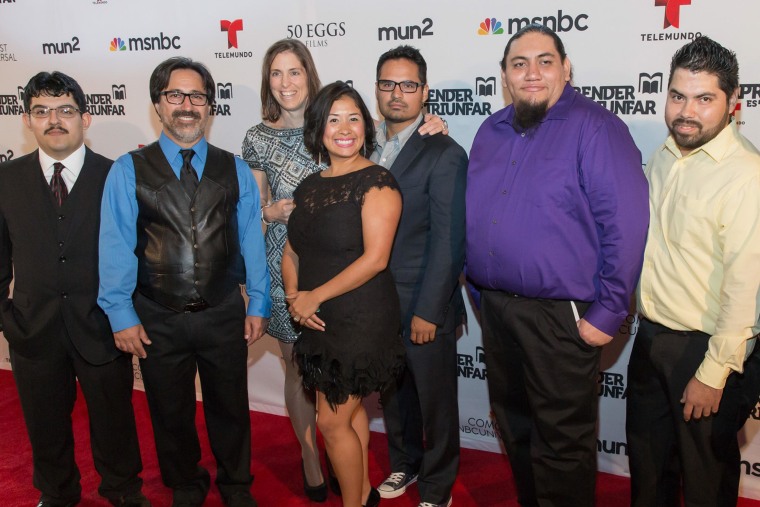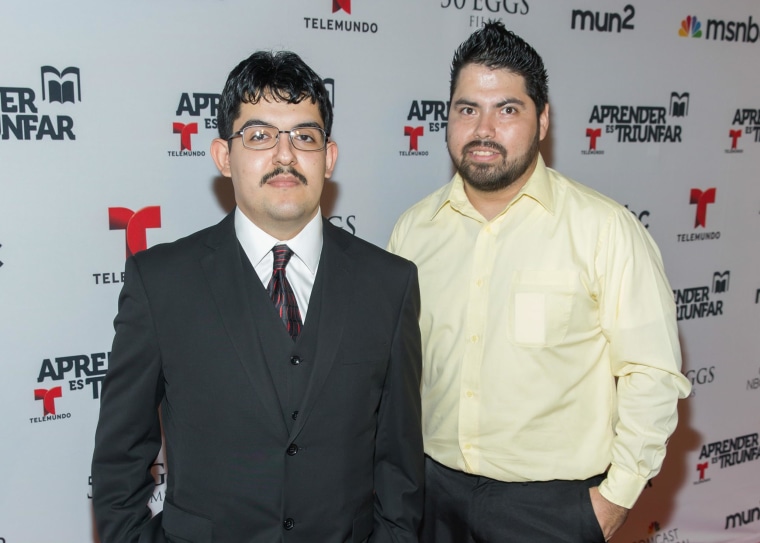NEW YORK, NY -- It's the stuff of movies - four undocumented Mexican-American high school students enter a NASA-sponsored robotics contest and beat MIT and other prestigious universities. Yet the unlikely victory did not lead to a successful or lucrative future in the tech and science world for these students, mainly because they were constrained by their immigration status. Their fascinating story is the subject of a new documentary, “Underwater Dreams,” airing Sunday on MSNBC and Telemundo, as well as an upcoming Hollywood film.
“These kids are incredible people,” said Underwater Dreams” filmmaker Mary Mazzio, who first learned of the story from an article in Wired Magazine. “Whether they are documented or not, it’s a waste of human capital to educate these kids and prevent them from contributing to society,” she said at a screening of the film in New York City.
“People need to know that there are good people who happen to be undocumented,” said Lorenzo Santillan, one of the four students from the 2004 Carl Hayden High School robotics team in Phoenix, Arizona.
Winning the competition was a triumph for the students, whose faculty advisor had entered the competition not knowing it was a college-level contest. Classmates Oscar Vazquez, Luis Aranda, Cristian Arcega and Santillan did not have much money, experience or faith in themselves, but they made a robot nicknamed “Stinky” out of duct tape and materials from Home Depot. While other schools invested thousands of dollars in their sophisticated projects, the Carl Hayden students spent about $800 on “Stinky.”
But life after high school has not been easy for the members of the 2004 Carl Hayden robotics team, mainly because of their lack of legal status. Cristian Arcega, 26, received a presidential scholarship to ASU, awarded to students at the top of their class. “But I only attended for a year, because it (the scholarship) was revoked by Proposition 300,” said Arcega.
“The next Einstein could be among us, he could be an undocumented kid. He needs to get all the opportunity he deserves.”
Prop 300 is an Arizona ballot measure that prevents undocumented students from getting in-state tuition or financial aid. “I didn’t have the money to stay in school,” he said. “It was devastating, especially since I had turned down offers from other colleges outside Arizona.”
Arcega would have liked to obtain a Master’s Degree, and then work in research and development. Instead, he said he is “mostly trying to get by.”
Lorenzo Santillan is working as a line cook and in catering. He is able to work because of DACA (Deferred Action for Childhood Arrivals), the Obama administration’s program that offers relief from deportation to young people brought to the U.S. illegally as children. “I am glad that I have DACA,” but it is not what I want,” he said. “I have been living here since I was 9 months old, I am as American as anybody else.”
The leader of the 2004 team, Oscar Vazquez, graduated from Arizona State University (ASU), which he paid for by working construction jobs and through private scholarships. Precluded from joining the military by his immigration status, he returned to Mexico, where he worked in the fields for $3 a day. It was only through the activism of friends in Arizona that Sen. Dick Durbin (D-Ill.) heard about his case and helped him obtain an immigration waiver to serve in the military. Vazquez did two tours of duty in Afghanistan and now works for a railroad company.
Vazquez said he hopes audiences will see a hopeful message in “Underwater Dreams.” “It is mostly a story of perseverance, of not letting obstacles keep you from pursuing your dreams," he said. "I hope anyone in a similar situation, even if they are undocumented, will keep going and maybe someday they can be anybody they want to be.”

According to a 2005 report by the Pew Center, 49 percent of undocumented high school students drop out before graduation. While these numbers may have improved since DACA was introduced in 2012, undocumented students still face financial and logistical hurdles to accessing higher education (earlier this month, a federal appeals court blocked an executive order by Arizona Governor Jan Brewer that denied driver’s licenses to DACA recipients). All four of the team members could have gained citizenship through the Dream Act, which died in Congress in 2010.
Despite their subsequent challenges, the 2004 Carl Hayden robotics team has left a significant legacy. The school’s robotics club is thriving today, inspiring students to learn about science and technology. Several of the team’s former members helped form the Arizona Dream Act Coalition, an immigrant-led youth organization.
Filmmaker Mary Mazzio hopes her film will challenge audiences to rethink their preconceptions. “Many Americans carry around old stereotypes about people who we see as ‘different,’ about people from low-income neighborhoods, and so on. The truth is, talent and opportunity may exist in places we don’t expect it.”
Despite their subsequent challenges, the 2004 Carl Hayden robotics team has left a significant legacy. The school’s robotics club is thriving today, inspiring students to learn about science and technology.
Santillan said he and his robotics team were not the only high school students in that situation. “There are many stories like ours, the only difference is, we have received more attention," he said.
“Hey, the next Einstein could be among us, he could be an undocumented kid,” Santillan added. “He needs to get all the opportunity he deserves.”
The documentary airs Sunday, July 20 on MSNBC, Telemundo, and mun2, and is narrated by “Cesar Chavez” star Michael Peña.
The unlikely national contest winners are also the subject of an upcoming Hollywood film starring George Lopez, Jamie Lee Curtis, and Marissa Tomei. Joshua Davis has also written a book about the team (due out in September) entitled “Spare Parts.”
